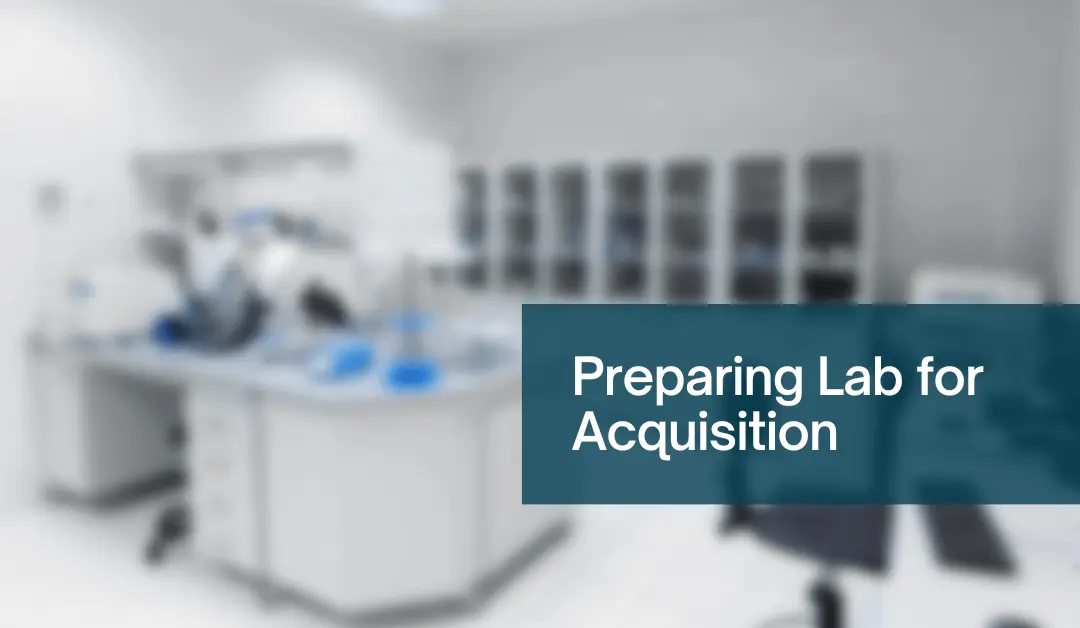Selling a clinical or pathology lab is one of the most significant—and complex—transactions an owner will undertake. Beyond EBITDA multiples, prospective buyers scrutinize regulatory compliance, payer contracts, assay menus, and operational risk. The good news? With 3–12 months of focused preparation, you can reduce deal friction, command a stronger valuation, and position your laboratory for a smooth exit. Let’s dive in.
1. Why Early Preparation Matters
Market perception of your lab’s value goes well beyond revenue. Buyers reward labs that demonstrate sustainable compliance, clean financials, and operational scalability—and discount those that don’t. Early readiness enables you to:
- Address compliance and licensure gaps before diligence begins.
- Optimize contracts, staff efficiency, and assay mix to boost EBITDA.
- Build a narrative that attracts both strategic and private‑equity buyers.
- Avoid last‑minute delays or price renegotiations.
2. Clarify Your “Why,” Deal Type, and Timeline
Define whether you want a complete exit, majority recap, or asset sale; your desired closing date; and any transition or earn‑out you’ll accept. Clear goals help you tailor every other preparation step and set realistic expectations for your team.
Quick read: Buying vs Building a Laboratory – Key Considerations
3. Assemble a Baseline Valuation Early
Commission a working valuation 6–12 months before going to market. Use the CLIA SELF framework (Contracts, Licensure, Infrastructure, Assays, Science, Employees, Location, Financials) to identify which levers—payer mix, test menu, instrument utilization—drive the multiple.
Resource to learn more about CLIA SELF framework: How to Determine the Value of a Medical Laboratory
4. Financial Readiness
- Prepare to present CPA‑reviewed financial statements covering at least three years.
- Segment revenue by test type, payer class (Medicare, Medicaid, commercial, self‑pay), and top clients.
- Identify and eliminate unprofitable accounts or chronic bad‑debt offenders.
- Prepare pro forma projections that reflect recent operational improvements or contract wins.
5. Regulatory & Licensure Audit
Buyers will comb through CLIA certificates, CAP/COLA inspection reports, and state permits. Resolve deficiencies and be ready to provide any explanations before launching a sale.
Recommended actions:
- Verify that test menus align with the CLIA complexity and state requirements.
- Confirm state-required licenses (NY, PA, CA, NJ, MD) are active and transferable.
- Ensure SOPs, IQCPs, maintenance logs, and reagent‑lot traceability are complete and current.
- Close any open issues with CMS, MACs, or state boards.
6. Operational Strength & Staffing
A tidy, well‑run lab photographs well during site visits. Operational excellence also reassures buyers that Day‑1 performance won’t dip post‑close.
Key focus areas:
- Document instrumentation (e.g., Roche, ThermoFisher, Abbott) with service contracts and throughput metrics.
- Highlight automation investments or LIS integrations that reduce labor cost per test.
- Map workflow efficiencies—turnaround time, capacity utilization, redundancy.
- Assess key‑person dependencies; ensure technical supervisors and directors have succession coverage.
- Verify that employee files contain current certifications and any non‑compete or IP agreements that will roll over.
7. Review Insurance & Reimbursement Contracts
- List every payer contract with effective dates and credentialing renewals.
- Ensure that you have copies of all insurance contracts and enrollment confirmations
- Flag transferability restrictions or change‑of‑ownership clauses.
- Resolve outstanding audits, claw‑back disputes, or overpayment letters.
Primer: Will Insurance Contracts Transfer to a New Lab Owner?
8. Legal and Contractual Cleanup
- Ensure ownership structure and cap‑table documentation are up to date.
- Review or renegotiate unfavorable supply or reference‑lab agreements.
- Resolve any pending litigation or compliance investigations with counsel.
9. Third‑Party Audit: A Smart Pre‑Sale Move
Independent billing, compliance, or operational audits uncover risks and demonstrate professionalism to buyers.
- Revenue‑cycle audits surface missed billing opportunities or denial trends.
- Compliance audits flag OIG risks, documentation gaps, or over‑utilized CPT codes.
10. Build a Secure Virtual Data Room (VDR)
Populate your VDR with the core materials buyers will request:
| Category | Must‑Have Documents |
| Financial | 3‑year P&L, balance sheet, AR aging, payer mix, major contracts |
| Regulatory | CLIA, CAP/COLA letters, state licenses, proficiency‑testing scores |
| Legal | Lease, equipment liens, vendor & client MSAs, insurance policies |
| HR | Org chart, W‑2 counts, comp plans, benefit summaries |
11. Choose the Right Advisory & Marketplace Partner
Laboratory Nexus’ Seller Services team packages opportunities, vets qualified buyers, and works with you to assist in negotiating LOIs—all while maintaining strict confidentiality.
Learn more: Expert Services for Laboratory Sellers
12. Understand Buyer Types
- Strategic Lab Networks – integrate your lab into a larger platform; often retain staff.
- Private Equity – seek scalability and rapid EBITDA growth; may require owner rollover equity.
- Clinical Entrepreneurs – want a turnkey operation; thorough documentation and SOPs are critical.
13. Craft a Compelling Confidential Information Memorandum (CIM)
Translate data into a narrative that highlights growth opportunities (new assays, geographic expansion) and mitigates risks (COVID revenue cliffs, single‑client concentration). Keep it factual yet persuasive.
14. Your M&A Support Team
| Professional | Role in the Transaction |
| Laboratory M&A Advisor | Sources buyers, manages outreach, coordinates diligence |
| Healthcare Attorney | Ensures regulatory compliance, drafts sale agreement, reviews licensure |
| Accountant / CFO Advisor | Prepares financials, projections, and QoE support |
| Lab Consultant | Supports LIS, assays, SOPs, or validation needs |
| Billing / Compliance Audit Partner | Pre‑sale risk mitigation and revenue optimization |
15. Start Early – Timeline Guidance
The best exits start 12–24 months in advance. This window lets you correct compliance issues, boost EBITDA, and build a buyer‑ready data room without disrupting lab operations.
16. Marketing Readiness for a Top-Dollar Sale — Elevate Your Brand & Digital Footprint
Brand equity and online reputation now appear in the first pages of a buyer’s diligence checklist—right alongside EBITDA and CLIA certificates. In healthcare deals, strong branding can preserve trust with patients and referral sources; shabby or inconsistent branding, on the other hand, can push bidders to discount or walk away. Studies of recent healthcare transactions show that brands with high regional recognition command measurable licensing value during joint ventures and change-of-ownership negotiations.
Just as critically, M&A teams scrape websites, social channels, and review sites to gauge customer sentiment and digital risk. Perform a “digital footprint due diligence”—a process that can uncover hidden revenue levers or red flags that derail valuation.
Partner Spotlight: If your in-house team is at capacity, consider a specialist agency that knows CLIA, HIPAA, and lab buyer personas. WaveDigital’s digital marketing solutions for medical labs offer turnkey SEO, website modernization, and brand refresh packages designed to make your lab look acquisition-ready within one quarter.
Nailing these elements does more than impress bidders—it widens the buyer pool, shortens diligence, and can add 0.5-1.0× EBITDA to the final multiple by reducing perceived commercial risk. Make marketing readiness part of your exit strategy, not an afterthought.
Final Thoughts & Next Steps
Preparing your lab for sale is part financial hygiene, part regulatory rigor, and very much strategic storytelling. By following this playbook—and partnering with advisors who understand the clinical‑lab landscape—you’ll negotiate from a position of strength and secure the value your laboratory deserves.
- Selling soon? We are ready to assist. Learn more here.
- Browse active listings.
- Need assistance acquiring a lab?
- Call +1 (919) 948‑6690 or Contact us


